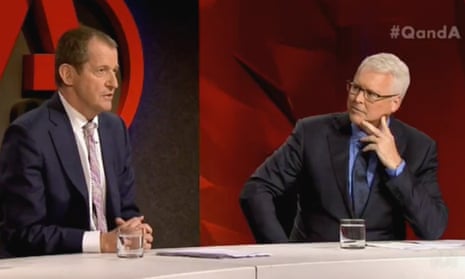Alastair Campbell has again compared Donald Trump to Hitler, likening the race-fuelled attacks by the US president against four US congresswomen to those made during Nazi Germany.
The chief spin doctor to former British prime minister Tony Blair did not hold back on Monday night’s Q&A program on the ABC, taking on Trump and Boris Johnson, and regularly sparring with his fellow panel member, the conservative commentator Nick Cater.
On Trump, Campbell was asked about comments made during a GQ interview earlier in the Trump presidency comparing his administration to Nazi Germany. Saying he was reading The Rise And Fall Of The Third Reich, the 1960 history by American journalist William Shirer, Campbell said that “on every page you feel the resonance”.
“So that thing he did the other day with the four congresswomen of colour – Hitler was doing that stuff,” Campbell said, referring to racist comments by Trump in which he said four ethnic-minority congresswomen should “go back” to the countries they came from, despite three of the four having been born in the US and the fourth being a US citizen who came to America as a child refugee.
“I’m not saying he’s going to go out and kill six million people. I’m saying the seeds of fascism are being sown. If we’re not careful we’re heading in a dark and dangerous place,” he said.
When Cater countered that what he found troubling about modern society was an “increasing intolerance to free speech, particularly on the left”, Campbell repeatedly demanded to know: “What are you not allowed to say?”
Cater demurred, and when pressed by host Tony Jones on whether there was any justification for Trump’s comments, eventually said: “It’s not something I would have advised him to say.”
Of Johnson, likely to be the next UK prime minister, Campbell said: “Inside his head, he is Winston Churchill. In reality, he’s a hack.”
Campbell is in Australia to speak at events hosted by Orygen and the University of New South Wales Centre for Ideas on the politics of mental health. He has spoken publicly about his own breakdown in the 1980s, and after one questioner spoke emotionally about her brother’s suicide he challenged leaders such as Scott Morrison to do more than talk about addressing mental health issues.
Suicide takes more lives than cancer or road deaths, so why isn’t there greater priority to life threatening mental illness? #QandA pic.twitter.com/zdigJdgvqR
— ABC Q&A (@QandA) July 22, 2019
“When Theresa May became PM in the UK she said mental health was going to be a priority, when David Cameron came in he said mental health was going to be a priority,” he said.
“The words are so easy. So Scott Morrison has come in and he said his goal is zero suicide. That’s a very big, bold goal. But don’t just say it.”
Campbell said dealing with mental health stigma required a change in the way it was thought of. “We don’t have a mental health service. We have a mental crisis service,” he said.
Also on the panel was the former Western Australia premier Geoff Gallop, who quit politics in 2006 to receive treatment for depression. He agreed with Campbell, and reflected on the fact that his mental health forced him out of public office, saying he had been “frightened” to address it in public.
Geoff Gallop outlines what he sees as the best way to develop strong mental health policy in Australia #QandA pic.twitter.com/rFWZElGmwq
— ABC Q&A (@QandA) July 22, 2019
“There’s no doubt that in theory I could have stayed on and perhaps tried to deal with the issue from within the system,” he said.
“But I made a choice that I would leave and try something different. We really should have a situation where it’s not necessary that we leave our employment [but] politics was a little bit different in the nature of what you do and I was bit frightened about the prospect of talking about it in the context of politics.
“I’ll admit that. Because the press are looking at you every day. Everyone is looking at you.”
